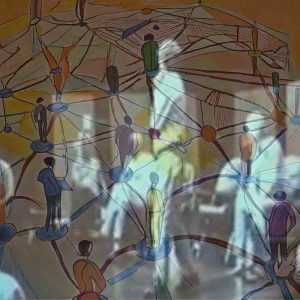
My response to Mark Johnson’s Blog dated Monday February 12, 2024 titled Cybernetic Boa Constrictors. Mark wrote: “…. But what’s happened with cybernetics? To put it very simply (and perhaps, rudely), cybernetics started as science – Wiener, Ashby, von Foerster, Bateson. But it has ended up as religion. There is no longer cybernetic analysis – no consideration of what “variety” means – or homeostasis, transduction, viability, difference, information (ok, that’s tricky), entropy, regulation, recursion, distinction, construction, ontology, epistemology, etc.”
Thanks, Mark for the provocation. I’ll start with your comment: “To put it very simply (and perhaps, rudely), cybernetics started as science – Wiener, Ashby, von Foerster, Bateson. But it has ended up as religion.”
Yes Mark, cybernetics may be considered a science. Yet cybernetics has been defined in many ways for quite some time now. Humberto Maturana once defined cybernetics as “the art and science of human understanding.
Some even consider cybernetics not a science but the art of maintaining equilibrium in a world of constraints and possibilities. (in @ 3:15)
I personally consider cybernetics a wonderful alternative to religion, not a belief system, since beliefs, nested in absolute Truths, are problematic. Instead, I view cybernetics as a transdisciplinary point of departure for exploring radical alternatives to our current beliefs and premises that are literally killing us. (MC Bateson 2011)
After all, believers do make liars. (Herbert Brün #6 and #7)
For me, cybernetics is a passion not a religion or belief system, and I am very passionate about any cybernetic thinking and doing that goes against the hegemonic ideas that are literally killing us all.
As you might know Mark, my cybernetic passion is often interpreted as problematic. Ask around. The same was true for Herbert Brün whose desires for a new or more honest language space, nested in his cybernetic epistemology, included performances that were often interpreted as violence. Ask around.
The cybernetics I have come to know, create, and love is mainly oriented by a variety of interactions and deep conversations I have experienced as a participating member of the ASC over the past several decades. In fact, I first met you at the 2010 ASC conference in Troy NY during one of those deep conversation events.
The cybernetics I have come to know and love that is not nested in a particular Truth or Belief but one nested in a variety passionate ideas and premises.
So passions yes, beliefs, or religion, no.
Mark in regard to your comment: “There is no longer cybernetics analysis – no consideration of what “variety” means – or homeostasis, transduction, viability, difference, information (ok that’s tricky), entropy, regulation, recursion, distinction, construction, ontology, epistemology, etc.”
What have you been reading? Or perhaps, rudely stated, what have you NOT been reading? Not likely, anything I have been reading, writing, or producing, over the several years. So.
Here is a taste of what I consider contemporary cybernetics in which I and others explore implicitly and explicitly a variety of concepts you mention in your February 12th blog. It is the December 2022 American Society for Cybernetics Speakers Series event entitled, One Possible Model for Designing social Transformations.
Mark, let me be clear, I do consider Weiner, Ashby and Bateson as well as others from the 1940s and 1950s as the first-formal cyberneticians. Cyberneticians who generated and polished many of their cybernetic premises during and through their involvement in the first MACY conferences. Ideas that continued to percolate in the late 1960’s and into the 1970’s at the Biological Computer Lab, orchestrated by Heinz von Foerster at the University of Illinois, and through the ASC. Ideas that evolved into what is known as a second-order cybernetics or the cybernetics of cybernetics.
I consider the first-generation of second-order-cyberneticians to include people like Gertrude Stein, Margaret Mead, Heinz von Foerster, Herbert Brun, Humberto Maturana, Ernst von Glasersfeld and Gordon Pask.
Then there is the second-generation of a second-cyberneticians that also orient my cybernetic thinking and doing. People like Mary Catherine Bateson, Margaret Boden, Francisco Varela, Annetta Petretti, and Rodney Donaldson.
Today, mainly through my involvement with the ASC and the new MACYs group I continue to evolve my cybernetic thoughts, premises and ideas through deep conversations that embrace our differences while we live in love with each other. Maybe you could check us out?
Best, Bee well,
Jude
PS Thanks to Diane Levings for helping me getting this out before I go dark!